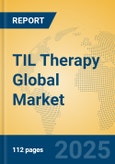The industry has achieved significant regulatory milestones, with FDA accelerated approval of lifileucel (Amtagvi) in February 2024 for advanced melanoma patients, marking the first TIL therapy approved for solid tumor treatment. This breakthrough has catalyzed increased investment in TIL technology platforms, manufacturing infrastructure, and clinical development programs across multiple cancer indications. The market benefits from growing understanding of tumor microenvironments, advancing cell therapy manufacturing capabilities, and expanding clinical evidence supporting TIL efficacy across various cancer types.
Market Size and Growth Forecast
The global TIL therapy market is projected to reach approximately 150-250 million USD by 2025, with an estimated compound annual growth rate of 35%-45% through 2030. This exceptional growth trajectory is supported by expanding clinical pipelines, increasing regulatory approvals, growing oncology treatment spending, and advancing manufacturing technologies enabling broader patient access.Regional Analysis
North America dominates the TIL therapy market with growth rates of 40%-50%, primarily driven by advanced clinical infrastructure, supportive regulatory pathways, and significant venture capital investment in cell therapy platforms. The United States leads with established cancer centers offering TIL therapy, comprehensive reimbursement frameworks, and robust clinical trial networks. The region benefits from leading biotechnology companies, specialized manufacturing facilities, and growing physician expertise in adoptive cell therapy administration.Europe exhibits growth rates of 30%-40%, with countries like Germany, France, and the United Kingdom developing TIL therapy capabilities through academic medical centers and emerging biotechnology companies. The region emphasizes regulatory harmonization, manufacturing quality standards, and equitable patient access across diverse healthcare systems.
Asia Pacific shows growth potential of 25%-35%, led by countries with advancing cancer care infrastructure and growing biotechnology sectors. Japan and South Korea demonstrate particular strength in cell therapy development, while China represents an emerging market with significant long-term potential.
South America and MEA regions demonstrate earlier-stage development with growth rates of 15%-25%, primarily focused on establishing clinical capabilities and regulatory frameworks for advanced cell therapies.
Application Analysis
Cancer Treatment Applications: TIL therapy addresses multiple solid tumor types including melanoma, cervical cancer, ovarian cancer, and various sarcomas. The therapy demonstrates particular efficacy in immunologically "hot" tumors with existing immune infiltration. Growth drivers include expanding clinical evidence, broadening approved indications, and advancing combination therapy approaches with checkpoint inhibitors and other immunomodulatory agents.Key Market Players
Iovance Biotherapeutics Inc. leads the TIL therapy market with lifileucel approval and comprehensive clinical pipeline addressing multiple solid tumor indications. The company operates specialized manufacturing facilities and maintains extensive clinical development programs across various cancer types.Adaptimmune Therapeutics Plc. focuses on engineered TCR therapies and TIL platforms, combining genetic engineering with adoptive cell therapy approaches to enhance treatment efficacy.
Achilles Therapeutics Ltd. develops personalized TIL therapies targeting patient-specific tumor antigens, representing a precision medicine approach to adoptive cell therapy.
Instil Bio Inc. advances CoStAR-TIL programs designed to enhance tumor microenvironment activity, with ITIL-306 receiving IND clearance for clinical development.
KSQ Therapeutics Inc. develops CRISPR-engineered TIL (eTIL) therapies, with KSQ-004EX receiving FDA IND clearance, representing next-generation TIL platforms with enhanced functionality.
Industry Value Chain Analysis
The TIL therapy industry value chain encompasses sophisticated patient selection processes, tumor tissue procurement, lymphocyte isolation and expansion, quality control testing, and specialized administration procedures. Upstream activities involve patient screening, tumor biopsy procedures, and tissue processing to identify suitable TIL populations.Manufacturing processes require advanced cell culture facilities, specialized media and reagents, extensive quality control systems, and cryopreservation technologies. The industry demands highly trained personnel, sophisticated equipment, and stringent regulatory compliance throughout the manufacturing process.
Distribution involves specialized logistics for cryopreserved cell products, coordination between manufacturing sites and treatment centers, and careful timing of product delivery to align with patient conditioning regimens.
Clinical administration requires specialized oncology centers with adoptive cell therapy expertise, intensive care capabilities for managing potential toxicities, and comprehensive patient monitoring systems throughout the treatment process.
Market Opportunities and Challenges
Opportunities
- Expanding Cancer Indications: Growing clinical evidence supports TIL therapy applications across diverse solid tumor types, creating substantial market expansion opportunities. Combination therapy approaches with existing cancer treatments represent high-value development pathways.
- Manufacturing Scale-up: Advancing automated manufacturing technologies and standardized processes enable broader patient access and improved cost-effectiveness, supporting market growth across diverse healthcare systems.
- Personalized Medicine Integration: TIL therapy's inherently personalized approach aligns with precision medicine trends, creating opportunities for patient-specific treatment optimization and improved clinical outcomes.
- Global Market Expansion: Emerging markets represent significant growth opportunities as healthcare infrastructure develops and regulatory frameworks mature for advanced cell therapies.
Challenges
- Manufacturing Complexity: TIL therapy requires sophisticated manufacturing processes, specialized facilities, and highly trained personnel, creating significant operational challenges and cost pressures.
- Regulatory Requirements: Complex regulatory pathways for cell therapies require extensive clinical data, manufacturing validation, and ongoing compliance monitoring, creating development timeline and cost challenges.
- Patient Access and Cost: High manufacturing costs and specialized administration requirements create patient access challenges and reimbursement complexities across different healthcare systems.
- Clinical Variability: Patient-specific tumor characteristics and immune system variations create treatment response variability, requiring careful patient selection and outcome prediction strategies.
This product will be delivered within 1-3 business days.
Table of Contents
Companies Mentioned
- Iovance Biotherapeutics Inc.
- Adaptimmune Therapeutics Plc.
- Achilles Therapeutics Ltd.
- Intima Bioscience Inc.
- Nurix Therapeutics Inc.
- KSQ Therapeutics Inc.
- Obsidian Therapeutics Inc.
- PACT Pharma Inc.
- Neogene Therapeutics
- Instil Bio Inc.








